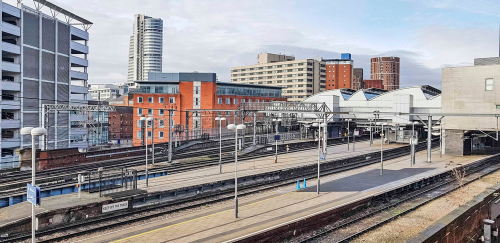
Theresa May has announced that ten UK cities have been shortlisted for a share of £1.7bn government funding in a bid to improve transport links
In order to "help spread growth in London" the Prime Minister has said the funding will form part of her administration's "transforming cities" fund announced last year. Six authorities, including the West Midlands, Greater Manchester, Cambridge and Peterborough, Liverpool, the West of England and Tees Valley, have already recieved £840m, the government have said.
The government claims that the Transforming Cities Fund is already delivering major improvements for people across England. The authorities which have already recieved funding have put the money towards such schemes as the Brierly Hill tram lines extension in the West Midlands and £160m towards the Beeline Cycle Network in Greater Manchester. Set to be the largest network of it's kind in the UK, the proposal for 1,000 miles of interlinked bike and pedestrian lanes will connect communities across its 10 boroughs and help make cycling and walking a safer option for people living in the region.
Over the next four years, the new allocation of funding will be used to improve transport links in city regions, linking travel to work areas, increasing access to jobs and helping ensure that businesses have the infrastructure they need to thrive. The funding could go towards upgrades such as new bus routes between residential areas and major employment hubs, smart technology aimed at reducing congestion, or rolling out docking stations for e-bikes.
Local authorities in Derby, Nottingham, Leicester, the North East, Norwich, Plymouth, Portsmouthm Southampton, Sheffield, Stoke-on-Trent and West Yorkshire have now been invited to send off bids for funding. Ministers have said that in practice the money will go towards new bus routes, smart technology aimed at reducing congestion and rolling out docking stations for e-bikes.
May has stated;
Our great cities and their suburbs are home to millions of people and world-beating business... We want to help them succeed, so as part of our modern industrial strategy we will fund £840m of upgrades for better, safer, faster transport links. These improvements to vital infrastructure will help spread the growth beyond London and empower local businesses to create more, better-paying jobs - opening up more opportunities to help people get on in life and be rewarded for their hard work
The ten shortlisted city regions will each recieve an initial £50,000 as well as support from Government to co-develop the strongest cases for investment.
Once finalised, ministers will consider the relative strength of each bid and their impact on "improving connectivity, supporting employment and driving up productivity."
Chris Grayling, the transport secretary, added "Good bus, cycle and tram routes play a huge role in increasing the vitality and vibrancy of cities. These 10 areas now have the chance to transform their transport systems - making it easier for people to get around and enhance links to work, schools or shops".
But Labour's Andy Mcdonald, the shadow transport secretary, said "This is not new money, it's already been announced" he added that while half of the funding will go to city regions, "the rest will be fought over by cities and local authorities in a bidding war" after already enduring "eight years of Tory austerity... The city Transformation Fund offers little while there is a £10bn black hole in the road maintenance budget"
While the city regions finalise proposals, £60m from the Fund will be made available over the next year to share across the transport schemes aimed at tackling head on some of the most pressing challenges faced by the communities.
The projects supported by the Transforming Cities Fund will also help progress the government's mission to radically improve the ways in which people, goods and services move around the country through its Future of Mobility Grand Challenge. Under this committment, the UK will become a world leader in cutting-edge clean technology and reduce greenhouse gas emissions, whilst also making travel safer, improving passenger journeys and presenting enormous economic opportunities for the UK.
